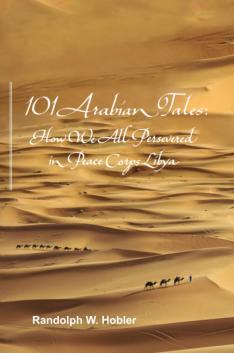Complete with over 200 photographs of the experience, Hobler paints a vivid image of the challenges and successes of Peace Corps service in Libya through a series of detailed anecdotes.
The author: After the Peace Corps, Randolph Hobler ’68 joined the Air National Guard; worked at Encyclopaedia Britannica Films; Benton & Bowles Advertising; IBM; for the Ministry of Education in Riyadh, Saudi Arabia; for Grey Direct; and then for many years as an international marketing consultant for 100-plus clients. He has published a number of articles across a variety of topics and wrote the book, music and lyrics for a musical about Meredith Willson, The Spirit of River City.
Opening lines: In the middle of an English lesson, I cast my eyes over my class of 36 restless Libyan fifth-grade boys. All wore white shawls swathed across their bodies in a variety of configurations. All wore tight-fitting red felt caps. Their faces varied from black to white. Most were swarthy like Arabs, but with a mix of Berber that had accumulated over the centuries. The classroom was adobe. It had no electricity. Open windows with no screens. Instead of a blackboard, a wall painted black. The grayish-brown desks were rough-hewn, two-to-a-student, without drawers. The door was well worn and splintered. It was time to introduce a new English word, the noun “knife.” To illustrate, I decided to draw the pocket-knife out of my pocket.Me: “Knife.”
Class: “Knife.”
Me: “This is a knife.”
Class: “This is a knife.”
On to the prepositions. I placed the knife on my table. “Where is the knife?”
“The knife is on the table!”
At this point I suddenly had a “Should I or shouldn’t I?” moment. “Knife” reminded me of a Bowie knife, (a very large knife like that in Crocodile Dundee) which in turn reminded me of The Adventures of Jim Bowie show on 1950s television. In the opening credits of the show, the hero cocks his arm and flings a Bowie knife through the air. It’s rendered in slow motion, with a dramatic helicopter-rotor phht, phht, phht sound. The knife then slams point-first-perfectly into a tree trunk, with a zonk effect followed by a sproing-sproing effect as the knife vibrates in place.
I put the knife in my hand. “Where is the knife?”
“The knife is in the hand!”
Do I dare open up the knife and replicate the opening credits of The Adventures of Jim Bowie? There’s that ratty old door fifteen feet to my left. It wouldn’t hurt the door. I put the knife on my head. “Where is the knife?”
“The knife is on the head!”
I was not a knife expert. I was not Jim Bowie. I never even played mumblety-peg as a kid. At best I did a little whittling or used a knife to cut string. If it worked, how great would that be? But if it failed, what a humiliation!
I put the knife under the table. “Where is the knife?”
“The knife is under the table!”
What the hell. I opened the knife. In one motion, I cocked my arm and swiveled to the left. Taking dead aim, I released the knife tumbling through the air. Ka-ching! It penetrated the door. It zonked. It sproinged. Not missing a beat, I said, “Where is the knife?”
The students didn’t answer. They were slack-jawed in amazement. A little louder, I said, “Where is the knife?” Still frozen. Even louder, I repeated, “Where is the knife?” Then in full-throated unison, they roared out a sentence they had never before uttered: “THE KNIFE IS IN THE DOOR!”
Behind my little anecdote above were three giants upon whose shoulders we stood. One, John F. Kennedy, bequeathed upon us the inspiration of the Peace Corps. Two, Noam Chomsky, the father of modern linguistics bequeathed upon us the principle that all languages can be taught the same way. Three, John Rassias, immersive foreign language pioneer who trained thousands around the world, bequeathed upon us the indefatigable energy, verve and drama to make classrooms come alive.
Review: “I have read dozens of Peace Corps memoirs and always find the impact of service on the individual writer to be profound. However, this memoir contains not just the memories and observations of one volunteer but of 100. It is therefore that much more authoritative.”
- Robert E. Gribbin, III, Ambassador to Rwanda and Central African Republic Peace Corps Volunteer — Kenya


